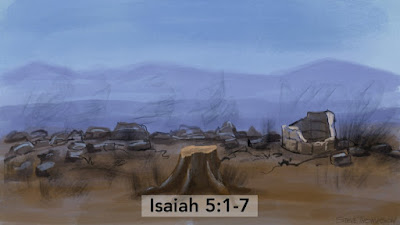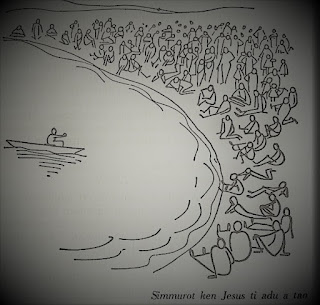The Prophet as a Singer and Social Critic
 |
| (illustration: Steve Thomason) |
Prophecy, a Slippery Concept
I usually begin my Prophets' class with a warning that the term "prophet" is notoriously slippery.
Nostradamus is a prophet as well as Al Mustafa, The Prophet (by Kahlil Gibran). Muhammad is also The Prophet and Iglesia ni Kristo's Felix Manalo is the prophet from the East, the third Elijah.
Our provincial superior of the SVD Philippine Central Province, Father Jerome Marquez, SVD, recently exhorted its members to be "prophets of hope" during this time of the pandemic.
Isaiah, the Singer, and Social Critic
When we come to the First Reading for this Sunday (10/3/2020), the prophet becomes a social critic as he belts out his Song of the Vineyard (Isaiah 5:1-7), the first protest song perhaps in the Bible.
He is Isaiah, the prophet in Jerusalem of the Eighth Century B.C.
Vayekav lemishpat (I expected justice)Vehinneh mispak (Behold, bloodshed!)
Litsdaka (For righteousness)
Vehinneh tseakah (Behold, the cry of the oppressed!)
The Social Problems in Isaiah's Time
- Your princes are rebels and comrades of thieves; Each one of them loves a bribe and looks for gifts. The fatherless they do not defend, the widow's plea does not reach them. (Isa 1:23 NAB)
- The Lord enters into judgment with the people's elders and princes: You, you who have devoured the vineyard; the loot wrested from the poor is in your houses. What do you mean by crushing my people, and grinding down the faces of the poor? says the Lord, the GOD of hosts. The LORD said: Because the daughters of Zion are haughty, and walk with necks outstretched, Ogling and mincing as they go, their anklets tinkling with every step, (Isa 3:14-16 NAB)
- Ah! Those who enact unjust statutes, who write oppressive decrees, Depriving the needy of judgment, robbing my people's poor of justice, Making widows their plunder, and orphans their prey! What will you do on the day of punishment, when the storm comes from afar? To whom will you flee for help? Where will you leave your wealth, Lest it sink beneath the captive or fall beneath the slain? For all this, his wrath is not turned back, his hand is still outstretched! (Isa 10:1-4 NAB)


Comments
Post a Comment